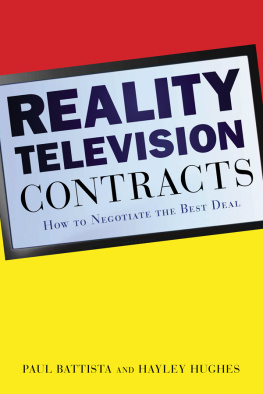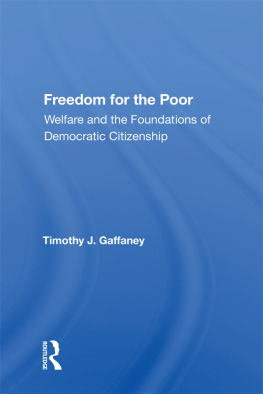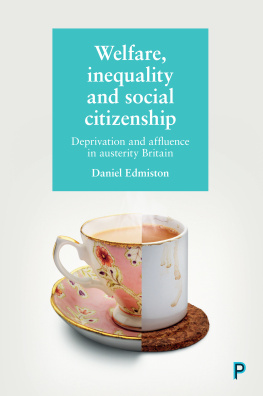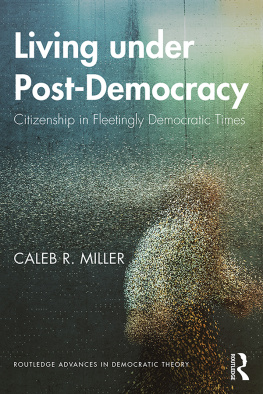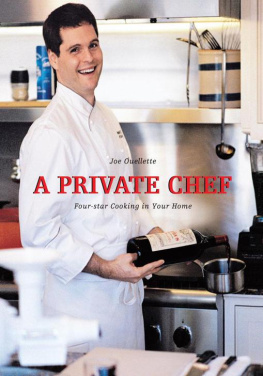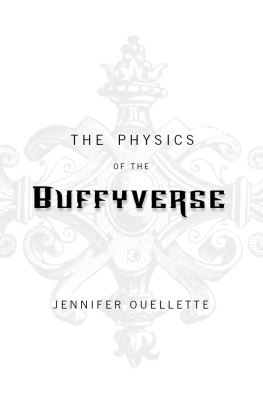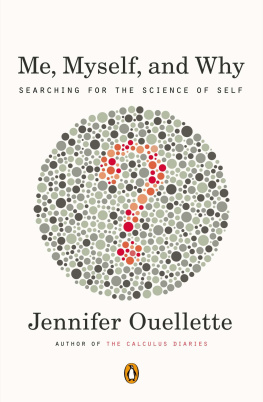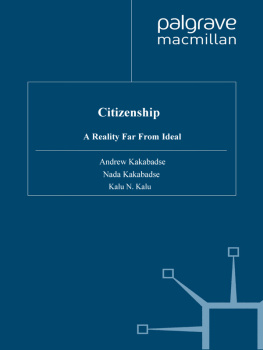Laurie Ouellette - Better Living through Reality TV: Television and Post-Welfare Citizenship
Here you can read online Laurie Ouellette - Better Living through Reality TV: Television and Post-Welfare Citizenship full text of the book (entire story) in english for free. Download pdf and epub, get meaning, cover and reviews about this ebook. year: 2007, publisher: Wiley-Blackwell, genre: Politics. Description of the work, (preface) as well as reviews are available. Best literature library LitArk.com created for fans of good reading and offers a wide selection of genres:
Romance novel
Science fiction
Adventure
Detective
Science
History
Home and family
Prose
Art
Politics
Computer
Non-fiction
Religion
Business
Children
Humor
Choose a favorite category and find really read worthwhile books. Enjoy immersion in the world of imagination, feel the emotions of the characters or learn something new for yourself, make an fascinating discovery.
- Book:Better Living through Reality TV: Television and Post-Welfare Citizenship
- Author:
- Publisher:Wiley-Blackwell
- Genre:
- Year:2007
- Rating:3 / 5
- Favourites:Add to favourites
- Your mark:
- 60
- 1
- 2
- 3
- 4
- 5
Better Living through Reality TV: Television and Post-Welfare Citizenship: summary, description and annotation
We offer to read an annotation, description, summary or preface (depends on what the author of the book "Better Living through Reality TV: Television and Post-Welfare Citizenship" wrote himself). If you haven't found the necessary information about the book — write in the comments, we will try to find it.
Better Living through Reality TV: Television and Post-Welfare Citizenship — read online for free the complete book (whole text) full work
Below is the text of the book, divided by pages. System saving the place of the last page read, allows you to conveniently read the book "Better Living through Reality TV: Television and Post-Welfare Citizenship" online for free, without having to search again every time where you left off. Put a bookmark, and you can go to the page where you finished reading at any time.
Font size:
Interval:
Bookmark:

through Reality TV
Post-welfare Citizenship
Laurie Ouellette and James Hay

vi
In 2004, TV viewers were enlisted to help guide and shape a human subject named Todd. Under the provocative mantra "Build a Better Todd," they watched video footage of the young man's daily life and voted on the recommendations of professional experts brought in to improve his image, attitude, social life, finances, and career trajectory. After considering the suggestions and strategies for Todd's selfbetterment presented during each episode's Todd Town Hall segment, viewers telephoned or texted their decision to the FX cable network. As part of his television "contract with America," the star of the reality program agreed to abide by the results of the viewer poll and transform his life accordingly. Over the course of the season, he was ordered to upgrade his wardrobe, pursue a new line of work, go on arranged dates, and undergo psychotherapy.
Todd TV adopted voting procedures to stage Todd's TV life as the outcome of a democratic process - as the government of an individual's conduct and choices by TV viewers and by Todd. Todd was required to temporarily give up his free will, bending to the wishes of the viewing public, and his lack of agency in the situations that ensued was a source of amusement. However, the point of the experiment was to cultivate Todd's ability to manage his own life, and steer his own fate by implementing the training provided by the TV program. In the parlance of political philosophy, Todd was being transformed into the sort of citizen who can be ruled through freedom, not control, and his reward for cooperating with the exercise (however humiliating it may have been) was also presented as his democratic duty to pursue happiness, self-fulfillment, and success. TV viewers were ostensibly empowered to help steer Todd's metamorphosis, but they were also invited to envision their own lives as a similar process of strategic decision-making and self-improvement. In this respect, Todd TV illustrates reality TV's preoccupation with "self work," and a reasoning about the nature and practice of governing in the current political epoch.
Todd TV operates at the intersection of two phenomena - the reinvention of television and the reinvention of government - addressed by this book. The program is part of the explosion of popular reality TV that began in the mid-1990s, and continues to this day. While reality TV has existed since the earliest days of the medium, only in the past decade has it become a major force in TV culture, with a vast array of reality-based entertainment and lifestyle programming taking hold during primetime and daytime hours, on network and specialized cable channels. Better Living through Reality TV situates the surge of popular nonfiction on television within strategies of liberal governance. We examine reality TV's relationship to ideals of "governing at a distance" and consider how reality TV simultaneously diffuses and amplifies the government of everyday life, utilizing the cultural power of television (and its convergence with books, magazines, the web, and mobile media) to assess and guide the ethics, behaviors, aspirations, and routines of ordinary people. At a time when privatization, personal responsibility, and consumer choice are promoted as the best way to govern liberal capitalist democracies, reality TV shows us how to conduct and "empower" ourselves as enterprising citizens. We consider the reasons for this, and explore the possibilities for agency it opens up and closes down.
The many subgenres of popular reality TV (dating shows, makeovers, job competitions, gamedocs, reality soaps, interventions, lifestyle demonstrations) share a preoccupation with testing, judging, advising, and rewarding the conduct of "real" people in their capacities as contestants, workers, housemates, family members, homeowners, romantic partners, patients, and consumers. In the process, reality TV circulates informal "guidelines for living" that we are all (at times) called upon to learn from and follow. These are not abstract ideologies imposed from above, but highly dispersed and practical techniques for reflecting on, managing, and improving the multiple dimensions of our personal lives with the resources available to us. Reality TV has become one of these resources. In a given week, we can learn how to succeed at work (The Apprentice, America's Next Top Model, Project Runway), how to win a desirable mate (The Bachelor/Bachelorette, Joe Millionaire), how to be stylish (What Not to Wear), sophisticated (Queer Eye for the Straight Guy) and personable (Beauty and the Geek), how to survive natural and manmade challenges (Survivor, Big Brother), how to nourish our health and psyche (Honey We're Killing the Kids, Starting Over), how to put our personal finances in order (Suze Orman, Mad Money with Jim Cramer), how to enhance an ordinary house or car (Trading Spaces, Pimp My Ride), how to transform our bodies (Extreme Makeover, The Swan, the Fitness Channel), how to maximize sexual performance and intimacy (Sex Inspectors, Berman and Berman), how to manage our families and domestic lives (Supernanny, Wife Swap, the Food Network), how to prepare for dangers and emergencies (Storm Stories, It Takes a Thief What Should You Do?), and even how to restore blighted cityscapes (Town Haul).
Reality TV is educational in this respect - but not in the same way as formalized attempts to harness television as a cultural technology capable of disseminating the "best that has been thought and said." Conceptualized as an extension of the public university, the earliest experiments in "education by television" were abstract, didactic, unadorned, and dominated by academics, journalists, and other bona fide intellectual authorities. This is not surprising, for the citizens these programs wished to "empower" were conceived as a gullible mass that needed guidance in the liberal arts to participate in the rituals of public democracy. Today's popular reality TV addresses the viewer differently. The citizen is now conceived as an individual whose most pressing obligation to society is to empower her or himself privately. TV assists by acting as a visible component of a dispersed network of supporting technologies geared to self-help and self-actualization. Ordinary people are now welcomed on screen, providing subject matter, "case studies," points of identification, and sources of disobedience and conflict. Experts are more apt to characterize themselves as "self-made" authorities trading in applied forms of business, lifestyle, and therapeutic knowledge. While there is no solitary explanation for this, the concrete skills, interpersonal advice, problem-solving techniques, step-by-step demonstrations, intimate feedback, motivational support mechanisms, and suggestions for everyday application offered by reality TV are undoubtedly more useful to strategies of governing through self and lifestyle than educational programs of the past. Reality TV's informal curriculum is also more profitable - not only because it combines learning with the pleasures of popular culture and the practicalities of everyday life, but because in a political climate that demands self-enterprise, the "civic" training it provides has become a desirable commodity.
Font size:
Interval:
Bookmark:
Similar books «Better Living through Reality TV: Television and Post-Welfare Citizenship»
Look at similar books to Better Living through Reality TV: Television and Post-Welfare Citizenship. We have selected literature similar in name and meaning in the hope of providing readers with more options to find new, interesting, not yet read works.
Discussion, reviews of the book Better Living through Reality TV: Television and Post-Welfare Citizenship and just readers' own opinions. Leave your comments, write what you think about the work, its meaning or the main characters. Specify what exactly you liked and what you didn't like, and why you think so.



